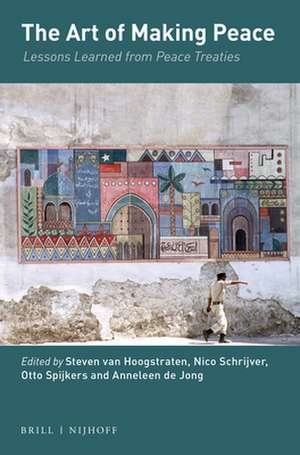The Art of Making Peace: Lessons Learned from Peace Treaties
Editat de Steven van Hoogstraten, Nico Schrijver, Otto Spijkers, Anneleen de Jongen Limba Engleză Paperback – 7 dec 2016
The volume offers the reflections of the leading experts attending the conference and the open debate which followed. The Treaty of Versailles of 1919, the mother of all peace treaties, is the first to be critically discussed. How should this treaty be viewed with the knowledge of today? What are the lessons learned in the light of historic developments? Subsequently, the Dayton Agreement, which sealed the end to the bloody conflict in the former Yugoslavia (1992-1995), and the Sudan Agreement, which came into being after lengthy negotiations in 2005, are analysed in the same way. Finally, the situations which arose in relation to the devastating wars between Iran and Iraq (1980-1988) and between Kuwait and Iraq are discussed. As these states could not reach a settlement themselves, the United Nations Security Council imposed the terms of the ceasefire and peaceful cooperation in important and innovative resolutions.
The book offers additional perspective by looking at the role of judicial settlement by the International Court of Justice or the Permanent Court of Arbitration, vis-a-vis the instrument of political mediation between states with the help of a third party. Mediation can be very effective, but certain conditions are required for it to be successful, conditions which are not easy to bring about in today’s world. Dispute settlement under international law is and continues to be the core business in the Peace Palace.
Preț: 488.31 lei
Preț vechi: 574.49 lei
-15% Nou
Puncte Express: 732
Preț estimativ în valută:
93.47€ • 101.56$ • 78.56£
93.47€ • 101.56$ • 78.56£
Carte indisponibilă temporar
Doresc să fiu notificat când acest titlu va fi disponibil:
Se trimite...
Preluare comenzi: 021 569.72.76
Specificații
ISBN-13: 9789004321236
ISBN-10: 9004321233
Dimensiuni: 155 x 235 mm
Greutate: 0.41 kg
Editura: Brill
Colecția Brill | Nijhoff
ISBN-10: 9004321233
Dimensiuni: 155 x 235 mm
Greutate: 0.41 kg
Editura: Brill
Colecția Brill | Nijhoff
Cuprins
List of Abbreviations; Preface;
From Utrecht’s Peace to Modern Times: Introductory Words by Martti Koskenniemi, University of Helsinki, Treaty of Utrecht Chair at Utrecht University
Part 1
The Versailles Peace Agreement, Paris (1919)
Introduction
1.1 Keynote: Sir Adam Roberts, British Academy for the Humanities and Social Sciences
1.2 Commentary: Randall Lesafffer, Tilburg University
1.3 Roundtable Debate
1.4 Interview with Sir Adam Roberts
Part 2
The Dayton Peace Agreement, Yugoslavia (1995)
Introduction
2.1 Keynote: Abiodun Williams, The Hague Institute for Global Justice
2.2 Commentary: Marc Weller, Cambridge University
2.3 Roundtable Debate
Part 3
The Sudan Peace Agreement (2005)
Introduction
3.1 Prelude: Peace and Its Confluences, a Short Story by Jamal Mahjoub
3.2 Keynote: Barney Afako, Former Legal Advisor to the Juba Peace Talks
3.3 Commentary: Sarah Nouwen, Cambridge University
3.4 Roundtable Debate
3.5 Interview with Sarah Nouwen
3.6 Interview with Barney Afako
Part 4
The Absence of Peace Agreements
Introduction to and Texts of Security Council Resolutions 598 (1987) and 687 (1991) Concerning Iran and Iraq
4.1 Keynote: Djamchid Momtaz, University of Tehran
4.2 Commentary: Nico Schrijver, Leiden University
4.3 Roundtable Debate
Part 5
Roundtable Debate: Mediation versus Adjudication
Peace Palace, 16 September 2014
Roundtable Debate: Mediation versus Adjudication
Part 6
Concluding Remarks on Lessons Learned
6.1 Concluding Remarks on the Conference by the Chairman of the Carnegie Foundation, Bernard Bot
6.2 Personal Experiences with Peace Mediation: An Interview with Bernard Bot, Former Minister of Foreign Affairs of The Netherlands
Epilogue; About the Contributors; List of Illustrations; Index.
From Utrecht’s Peace to Modern Times: Introductory Words by Martti Koskenniemi, University of Helsinki, Treaty of Utrecht Chair at Utrecht University
Part 1
The Versailles Peace Agreement, Paris (1919)
Introduction
1.1 Keynote: Sir Adam Roberts, British Academy for the Humanities and Social Sciences
1.2 Commentary: Randall Lesafffer, Tilburg University
1.3 Roundtable Debate
1.4 Interview with Sir Adam Roberts
Part 2
The Dayton Peace Agreement, Yugoslavia (1995)
Introduction
2.1 Keynote: Abiodun Williams, The Hague Institute for Global Justice
2.2 Commentary: Marc Weller, Cambridge University
2.3 Roundtable Debate
Part 3
The Sudan Peace Agreement (2005)
Introduction
3.1 Prelude: Peace and Its Confluences, a Short Story by Jamal Mahjoub
3.2 Keynote: Barney Afako, Former Legal Advisor to the Juba Peace Talks
3.3 Commentary: Sarah Nouwen, Cambridge University
3.4 Roundtable Debate
3.5 Interview with Sarah Nouwen
3.6 Interview with Barney Afako
Part 4
The Absence of Peace Agreements
Introduction to and Texts of Security Council Resolutions 598 (1987) and 687 (1991) Concerning Iran and Iraq
4.1 Keynote: Djamchid Momtaz, University of Tehran
4.2 Commentary: Nico Schrijver, Leiden University
4.3 Roundtable Debate
Part 5
Roundtable Debate: Mediation versus Adjudication
Peace Palace, 16 September 2014
Roundtable Debate: Mediation versus Adjudication
Part 6
Concluding Remarks on Lessons Learned
6.1 Concluding Remarks on the Conference by the Chairman of the Carnegie Foundation, Bernard Bot
6.2 Personal Experiences with Peace Mediation: An Interview with Bernard Bot, Former Minister of Foreign Affairs of The Netherlands
Epilogue; About the Contributors; List of Illustrations; Index.
Recenzii
"While it is difficult to do justice in a short review to a book that covers so many interlocking themes, it can safely be concluded that it makes an important contribution to this topical issue. Not pretending to be an academically-orientated work, it reflects the problems and processes experienced at the coalface of peace processes, and will for this reason be of value to a wide audience of both academics and practitioners. While the English expression holds that one should not judge a book on its cover, the importance of attractive presentation cannot be denied, and the publishers should be congratulated with its striking cover design and neat presentation."André Stemmet, Netherlands International Law Review (2019) 66:179–183
